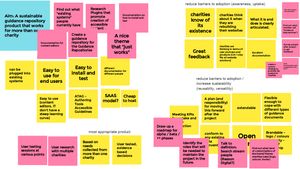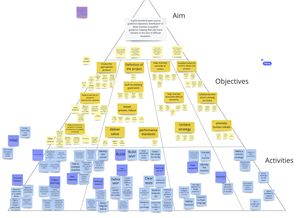Agile Collective are currently working alongside CAST / Catalyst on the alpha phase of a reusable service platform for publishing guidance to professionals. The project is called Shared service platform - Guidance repositories. As part of the project-wide commitment to open working and transparency, we’ll be publishing weeknotes telling you what we’ve been up to.
Earlier in the month we joined a welcome session where we found out that we would be working in parallel with a number of other well respected tech-for-good digital agencies, including Reason Digital, The Developer Society, Bit Zesty and SICCAR. The other streams of work include a 'Shared service layer - Search' project which sounds like it might be of relevance to the guidance repositories that we'll be working on. So already there is scope for collaboration within the streams of work. It was also fun to hear what tunes / genres / artists people had been listening to and I found out that KLF had just re-released an a couple of albums, which made for a nostalgic afternoon!
But back to this week, when the project started this week in earnest with some early discovery planning. As we started asking ourselves questions, it rapidly became apparent that we did not have a clear definition of what a ‘Guidance repository’ is, who the primary audiences will be, or which 5 charities we will be working with on the design. This is a chicken-and-egg problem if ever there was one. If we don’t have the charities to ask, how can we define the problem? If we don’t have a definition of the problem, how can we identify the best charity stakeholders to work with in the project?
Teamwork
I’m lucky enough to be working with Maria Young and Richard Rowley on this project, who both have a strong desire to generate real empathy for the people that our work will affect, leading to a driving passion to figure out who they are and what problems they are trying to solve. Knowing that we would be able to test assumptions with user research, we had to make some assumptions about what a guidance repository is, and who it is for. Through further conversations with Gilly and Chris at CAST we’ve learnt more about the evolution of the scope of the project and reduced the uncertainty around what charities we should be talking to and who their audiences are. One crucial decision is to restrict the focus to charities providing guidance to professional audiences.

Theory of Change
Confirming this primary audience and making assumptions about what guidance is allowed us to run an initial Theory of Change process to identify provisional aims of the product and the project and to define desired outcomes and strategies or activities. We started this in a Google Jam Board (great for rapidly throwing ideas onto virtual stickies) before moving it to a Miro board. Here's our Jam Board, and here's the Miro board

What’s coming next?
Over the course of the next few weeks we’ll be:
- Sending out a survey to charities that have applied for funding with Catalyst.
- Offering £1,000 from CAST to 5 charities selected from survey respondents to cover costs of engaging in workshops.
- Scheduling interviews and workshops for early March to explore the problem space and co-design solutions.
Key takeaways from this week:
- The focus for this phase of our research will be on guidance published by charities for professionals.
- Lack of clarity over the phrase ‘guidance repository’ means that defining our terms is a priority. We need a name or phrase that is well defined and mutually understood!
- We are keen to discover the major barriers to adopting a new system, as these may not be related to the functionality alone.
- There may also be challenges to sustainability that we need to explore.
- The remit is to help charities affected by Covid-19, and this will entail a focus on simplicity and rapid scaling. Part of our job will be to help charities anticipate difficult moments. Yet we should also build a solution that is stable and sustainable enough for charities in normal times.
- The initial Theory of Change enabled us to envisage a successful project and to highlight questions and risks that we may not have identified until later if we had moved straight into user research.
- The work that other agencies are doing as part of this Catalyst-run enterprise may overlap with ours. Collaboration at the research, design and recommendation phases will be key to offering a suite of services that work together.
- It is exciting and motivating to imagine the successful product in use by charities providing guidance in the future!
Get in touch!
If you're working with or for a charity publishing guidance, or are interested in any aspect of this work, do please get in touch with us to explore collaboration, we can achieve so much more by working together. You can tweet us @agilecollective or find other details on our contact page.
Thanks for reading!
